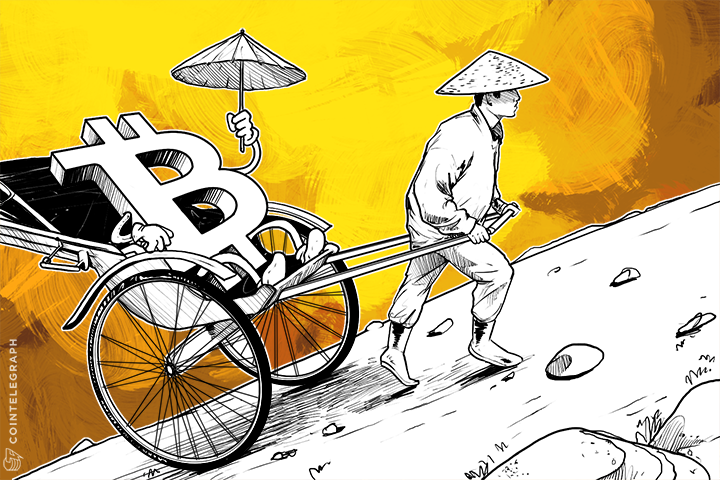Bitcoin price and market value have been less than volatile for the majority of 2015, but a Bitcoin bull market run has been started in China recently. The last two weeks have seen price values increase as much as 20%, peaking at US$295 on Sunday. This coincides with recent currency market manipulations of the Chinese Yuan/Reminbi by the Chinese government.
If you don’t know why the Bitcoin market is up, it's probably China
In the West, speculation of why Bitcoin has been on a “bull run” have centered around the recent EU VAT tax ruling in Bitcoin’s favor, but nothing correlates directly to the spike like the moves made in China. Provided by ZeroHedge in the chart below, you can see the positive effect the Chinese capital controls have had on bitcoin demand.
Oddly, Bitcoin demand has been much more linear and consistent in its movement than gold has been worldwide since actions began September 15, and gold has fallen recently while bitcoin has accelerated upwards.

As Cyprus, Argentina and Greece have already discovered recently, massive capital controls by the central government are counter-productive. Bitcoin provides an excellent way to move money abroad, and hedge against inflation, so any panic in the Chinese markets plays in Bitcoin’s favor.
Investing in gold is always a popular option in China, but moving gold overseas is not. Bitcoin has a natural advantage in mobility that gold will never share as the word seems to be realizing this fact out in the East, along with Chinese funds, moving from banks into bitcoin.
Crackdown on Underground Banking in and around China
The official capital controls by the Chinese government dictate that the citizenry can only take US$50,000 out of the country annually, or just 20,000 Yuan or about US$3,200 daily. Businesses can only exchange the Yuan for foreign currency with government approval. This has caused many workarounds, such as considerable real estate investment in the U.S., London, Canada and other locales. Also, the gambling Mecca of Macau is a common destination for those seeking an escape from the grips of The State.
Adding the desired amount of funds to you common UnionPay debit card, a Chinese citizen can very easily make a trip to Macau and make a $50,000 purchase work for them. Any number of store clerks and jewelry shops will run a transaction for HK$300,000 (US$50,000) and hand you cash. The receipt would be billed as a “general sale” purchase, and this can be done over and over again. Even Chinese politicians have used these measures themselves to get around the system.
This has led to Chinese officials intensifying a crackdown on such “underground banks,” where Chinese nationals shift money in and out of the country to skirt capital controls. Meng Qingfeng, China’s Vice Minister of Public Security, is urging police around the country to better coordinate with the Central Bank in the campaign, which will run through the end of November. Thus, seeing Bitcoin being used more and more as an option instead of these “underground banks” is reasonable to assume, and values may reflect that in the short-term.
Plus, new capital controls instituted by the PBOC (People’s Bank of China) started October 15, and that’s precisely when bitcoin values really started heading towards US$300. It requires banks to use a type of financial contract, known as currency forwards, to buy dollars while selling Yuan to set aside reserves with the Central Bank. Under the new requirement, a bank that has sold a total of $100 of the so-called currency forwards over the course of a month must deposit $20 at the Central Bank. The reserves will be held at zero interest for a year.
Disintermediation
Now, Bitcoin can be added to the list of options for those in a wealthy, cash-rich Chinese market, erasing so many middlemen and trips out of the mainland.
China’s need to keep funds in the country to pump up a weakening domestic market may be indirectly inflating the global Bitcoin market. It is estimated that over US$22 trillion is on deposit in Chinese banks, with it being the second largest economy on Earth. If any fraction of this value moves towards the US$4 billion Bitcoin market, the market force could change the digital currency’s economy forever. China alone can make the price spike of 2013 look like a minor accounting error within a couple of months’ time.
For the ardent Bitcoin investor, keep an eye on the financial news and the movement of currencies in the Chinese markets throughout the rest of 2015. They may hold the key to you Bitcoin investments’ financial future.


